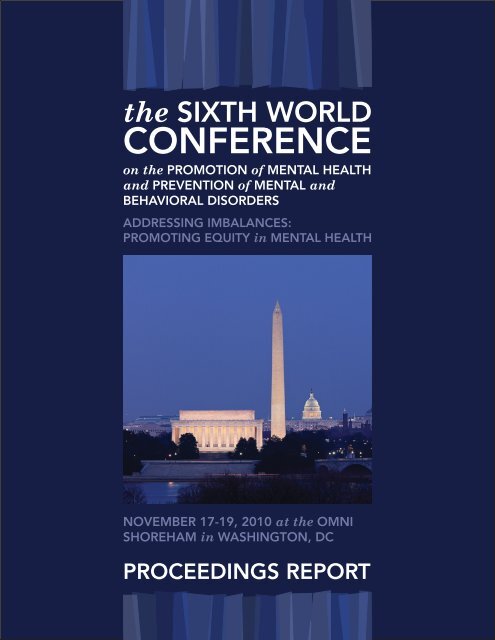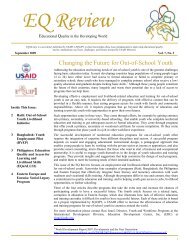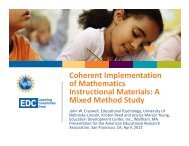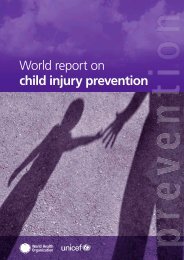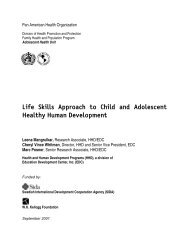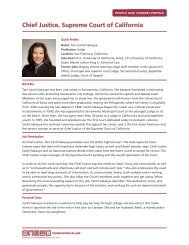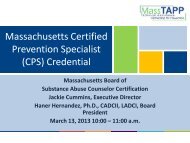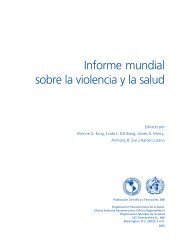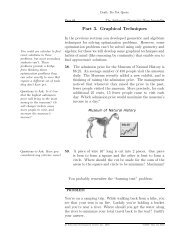The Sixth World Conference on the Promotion of Mental Health and ...
The Sixth World Conference on the Promotion of Mental Health and ...
The Sixth World Conference on the Promotion of Mental Health and ...
You also want an ePaper? Increase the reach of your titles
YUMPU automatically turns print PDFs into web optimized ePapers that Google loves.
<strong>the</strong> SIXTH WORLD<br />
CONFERENCE<br />
<strong>on</strong> <strong>the</strong> PROMOTION <strong>of</strong> MENTAL HEALTH<br />
<strong>and</strong> PREVENTION <strong>of</strong> MENTAL <strong>and</strong><br />
BEHAVIORAL DISORDERS<br />
ADDRESSING IMBALANCES:<br />
PROMOTING EQUITY in MENTAL HEALTH<br />
NOVEMBER 17-19, 2010 at <strong>the</strong> OMNI<br />
SHOREHAM in WASHINGTON, DC<br />
PROCEEDINGS REPORT<br />
1
This publicati<strong>on</strong> was produced by Educati<strong>on</strong> Development Center, Inc. under c<strong>on</strong>tract<br />
HHSN271201100320P with <strong>the</strong> Nati<strong>on</strong>al Institute <strong>of</strong> <strong>Mental</strong> <strong>Health</strong>, Nati<strong>on</strong>al Institutes <strong>of</strong> <strong>Health</strong>,<br />
U.S. Department <strong>of</strong> <strong>Health</strong> <strong>and</strong> Human Services, Be<strong>the</strong>sda, MD. Its c<strong>on</strong>tents are solely <strong>the</strong><br />
resp<strong>on</strong>sibility <strong>of</strong> <strong>the</strong> authors/speakers <strong>and</strong> do not necessarily represent <strong>the</strong> <strong>of</strong>ficial views <strong>of</strong> <strong>the</strong><br />
Nati<strong>on</strong>al Institute <strong>of</strong> <strong>Mental</strong> <strong>Health</strong>.<br />
Educati<strong>on</strong> Development Center, Inc.<br />
55 Chapel Street<br />
Newt<strong>on</strong>, MA 02458<br />
www.edc.org<br />
Nati<strong>on</strong>al Institute <strong>of</strong> <strong>Mental</strong> <strong>Health</strong><br />
6001 Executive Boulevard<br />
Be<strong>the</strong>sda, MD 20892<br />
www.nimh.nih.gov<br />
<strong>the</strong> SIXTH WORLD CONFERENCE <strong>on</strong> <strong>the</strong> PROMOTION <strong>of</strong> MENTAL HEALTH <strong>and</strong> PREVENTION <strong>of</strong> MENTAL<br />
<strong>and</strong> BEHAVIORAL HEALTH DISORDERS: ADDRESSING IMBALANCES: PROMOTING EQUITY in MENTAL<br />
HEALTH<br />
Co-Hosts:<br />
Educati<strong>on</strong> Development Center, Inc.<br />
<str<strong>on</strong>g>World</str<strong>on</strong>g> Federati<strong>on</strong> for <strong>Mental</strong> <strong>Health</strong><br />
<str<strong>on</strong>g>The</str<strong>on</strong>g> Clifford Beers Foundati<strong>on</strong><br />
<str<strong>on</strong>g>The</str<strong>on</strong>g> Carter Center<br />
Major Supporters:<br />
Substance Abuse <strong>and</strong> <strong>Mental</strong> <strong>Health</strong> Services Administrati<strong>on</strong>, U.S. Department <strong>of</strong> <strong>Health</strong> <strong>and</strong> Human Services<br />
<strong>Mental</strong> <strong>Health</strong> Commissi<strong>on</strong> <strong>of</strong> Canada<br />
Centers for Disease C<strong>on</strong>trol <strong>and</strong> Preventi<strong>on</strong><br />
Indian <strong>Health</strong> Services<br />
Co-Sp<strong>on</strong>sors<br />
<str<strong>on</strong>g>World</str<strong>on</strong>g> <strong>Health</strong> Organizati<strong>on</strong><br />
Pan American <strong>Health</strong> Organizati<strong>on</strong><br />
Internati<strong>on</strong>al Uni<strong>on</strong> for <strong>Health</strong> Promoti<strong>on</strong> <strong>and</strong> Educati<strong>on</strong><br />
Scientific Committee Members:<br />
David V. McQueen, Chair<br />
Thomas H. Bornemann<br />
Jerry Reed<br />
L. Patt Franciosi<br />
Helen Herrman<br />
Clemens M. H. Hosman<br />
Michael Murray<br />
Charles G. Ray<br />
Elena Berger<br />
Margaret Barry<br />
Mindy Fullilove<br />
Luiz Augusto Cassanha Galvão<br />
Mark T. Greenberg<br />
Melanie E. King<br />
Carl Lakaski<br />
Vikram Patel<br />
Jeffrey Reading<br />
Gail Ritchie<br />
Shekhar Saxena<br />
Sylvie Stachenko<br />
Ken Thomps<strong>on</strong><br />
Cheryl Vince Whitman<br />
Mark Wiest<br />
2
Report <strong>on</strong> <strong>the</strong> Proceedings<br />
Nearly 500 attendees, presenters, <strong>and</strong> keynote speakers from 41 countries participated, with<br />
representati<strong>on</strong> from Australia, Brazil, Cambodia, Canada, Croatia, Finl<strong>and</strong>, France, Germany, H<strong>on</strong>g<br />
K<strong>on</strong>g, India, Ind<strong>on</strong>esia, Irel<strong>and</strong>, Israel, Japan, Malaysia, Mexico, Nepal, Ne<strong>the</strong>rl<strong>and</strong>s, New Zeal<strong>and</strong>,<br />
Nigeria, Norway, Pakistan, Philippines, Pol<strong>and</strong>, Portugal, Puerto Rico, Saudi Arabia, Serbia, Singapore,<br />
South Africa, Sri Lanka, Sweden, Switzerl<strong>and</strong>, Taiwan, Thail<strong>and</strong>, Turkey, United Arab Emirates, U.K.,<br />
U.S, <strong>and</strong> Zimbabwe.<br />
Registrants included researchers, scientists, <strong>and</strong> practiti<strong>on</strong>ers in health, mental health, or o<strong>the</strong>r social<br />
service, as well as policy makers <strong>and</strong> educators.<br />
Scholarships were provided for 17 attendees from Canada, India, Ind<strong>on</strong>esia, Pakistan, Serbia, South<br />
Africa, Sri Lanka, Zambia, <strong>and</strong> <strong>the</strong> U.S.<br />
Program<br />
<str<strong>on</strong>g>The</str<strong>on</strong>g> <strong>the</strong>me <strong>of</strong> <strong>the</strong> <str<strong>on</strong>g>Sixth</str<strong>on</strong>g> <str<strong>on</strong>g>World</str<strong>on</strong>g> <str<strong>on</strong>g>C<strong>on</strong>ference</str<strong>on</strong>g> <strong>on</strong> <strong>the</strong> Promoti<strong>on</strong> <strong>of</strong> <strong>Mental</strong> <strong>Health</strong> <strong>and</strong> Preventi<strong>on</strong> <strong>of</strong> <strong>Mental</strong><br />
<strong>and</strong> Behavioral Disorders, held November 17-19 in Washingt<strong>on</strong>, DC, was Addressing Imbalances:<br />
Promoting Equity in <strong>Mental</strong> <strong>Health</strong>. Almost 500 researchers, scientists, practiti<strong>on</strong>ers, government <strong>of</strong>ficials,<br />
policy makers, <strong>and</strong> educators from 41 countries ga<strong>the</strong>red for three days <strong>of</strong> workshops to report findings,<br />
share research, discuss policies, <strong>and</strong> recommend future acti<strong>on</strong>s for <strong>the</strong> field.<br />
Keynote speakers included Ms. Pamela Hyde, Administrator <strong>of</strong> <strong>the</strong> Substance Abuse <strong>and</strong> <strong>Mental</strong> <strong>Health</strong><br />
Services Administrati<strong>on</strong> (SAMHSA) <strong>of</strong> <strong>the</strong> US Department <strong>of</strong> <strong>Health</strong> <strong>and</strong> Human Services (HHS); Dr.<br />
Leslie Ramsammy, Minister <strong>of</strong> <strong>Health</strong> <strong>of</strong> Guyana; Mr. Kjell B<strong>on</strong>devik, founder <strong>and</strong> President <strong>of</strong> <strong>the</strong> Oslo<br />
Center for Human Rights, <strong>and</strong> former Prime Minister <strong>of</strong> Norway; <strong>and</strong> Dr. Shekhar Saxena, Programme<br />
Manager in <strong>the</strong> Department <strong>of</strong> <strong>Mental</strong> <strong>Health</strong> <strong>and</strong> Substance Abuse at <strong>the</strong> <str<strong>on</strong>g>World</str<strong>on</strong>g> <strong>Health</strong> Organizati<strong>on</strong><br />
(WHO).<br />
In her welcome to participants, former First Lady Rosalynn Carter reflected <strong>on</strong> <strong>the</strong> decade since <strong>the</strong> first<br />
c<strong>on</strong>ference, which was held in <strong>the</strong> Carter Center in Atlanta, Georgia:<br />
Since <strong>the</strong> c<strong>on</strong>ference began, we have seen a growing awareness <strong>of</strong> <strong>the</strong> need for <strong>and</strong> benefits <strong>of</strong><br />
mental health promoti<strong>on</strong>, reaching all people in <strong>the</strong> settings where <strong>the</strong>y live, learn, <strong>and</strong> work, to<br />
safeguard <strong>and</strong> develop positive mental health. We have increasingly come to appreciate that<br />
<strong>the</strong>re can be no health without mental health—at any age…. We also have come to know that <strong>the</strong><br />
so<strong>on</strong>er we recognize <strong>the</strong> potential <strong>of</strong> a mental health problem <strong>and</strong> intervene early, <strong>the</strong> more likely<br />
we can prevent l<strong>on</strong>ger-term mental disorders.<br />
Mrs. Carter c<strong>on</strong>cluded, “Toge<strong>the</strong>r, we can pave <strong>the</strong> way to a future where attenti<strong>on</strong> to mental health is<br />
free from stigma <strong>and</strong> discriminati<strong>on</strong>, where all can receive <strong>the</strong> services <strong>the</strong>y need, <strong>and</strong> where <strong>the</strong>re is<br />
parity for addressing physical <strong>and</strong> mental health.”<br />
<str<strong>on</strong>g>The</str<strong>on</strong>g> c<strong>on</strong>ference program focused <strong>on</strong> advancing <strong>the</strong> call for acti<strong>on</strong> <strong>of</strong> <strong>the</strong> Melbourne Charter, which arose<br />
out <strong>of</strong> <strong>the</strong> 2008 Fifth <str<strong>on</strong>g>World</str<strong>on</strong>g> <str<strong>on</strong>g>C<strong>on</strong>ference</str<strong>on</strong>g> in Melbourne, Australia. <str<strong>on</strong>g>The</str<strong>on</strong>g> c<strong>on</strong>ference partnering organizati<strong>on</strong>s<br />
<strong>and</strong> participants developed a series <strong>of</strong> proposed acti<strong>on</strong> steps, including protecting indigenous cultures,<br />
ensuring policy is informed by evidence-based practices, eliminating stigma, <strong>and</strong> engaging communities<br />
to promote mental health <strong>and</strong> to prevent mental <strong>and</strong> behavioral disorders.<br />
3
<str<strong>on</strong>g>The</str<strong>on</strong>g> Melbourne Charter<br />
<str<strong>on</strong>g>The</str<strong>on</strong>g> Melbourne Charter asserts that mental health <strong>and</strong> well being are:<br />
• an indivisible part <strong>of</strong> general health;<br />
• essential for <strong>the</strong> well being <strong>and</strong> optimal functi<strong>on</strong>ing <strong>of</strong> individuals, families, communities, <strong>and</strong><br />
societies; <strong>and</strong><br />
• a fundamental right <strong>of</strong> every human being, without discriminati<strong>on</strong>.<br />
<str<strong>on</strong>g>The</str<strong>on</strong>g> Melbourne Charter affirms that mental health <strong>and</strong> well being is:<br />
• <strong>of</strong> universal relevance;<br />
• most threatened by poor <strong>and</strong> unequal living c<strong>on</strong>diti<strong>on</strong>s, c<strong>on</strong>flict, <strong>and</strong> violence; <strong>and</strong><br />
• a key indicator <strong>of</strong> a nati<strong>on</strong>’s social <strong>and</strong> ec<strong>on</strong>omic development.<br />
<str<strong>on</strong>g>The</str<strong>on</strong>g> Melbourne Charter believes that mental health <strong>and</strong> well being is:<br />
• everybody’s c<strong>on</strong>cern <strong>and</strong> resp<strong>on</strong>sibility;<br />
• best achieved in equitable, just, <strong>and</strong> n<strong>on</strong>-violent societies; <strong>and</strong><br />
• advanced through respectful, participatory means where culture <strong>and</strong> cultural heritage <strong>and</strong><br />
diversity is acknowledged <strong>and</strong> valued.<br />
<str<strong>on</strong>g>The</str<strong>on</strong>g> Melbourne Charter identifies principles <strong>and</strong> acti<strong>on</strong>s that governments, communities, organizati<strong>on</strong>s,<br />
<strong>and</strong> individuals can take to influence <strong>the</strong> interc<strong>on</strong>necting social, ec<strong>on</strong>omic, cultural, envir<strong>on</strong>mental, <strong>and</strong><br />
pers<strong>on</strong>al factors that influence mental health <strong>and</strong> well being. For more informati<strong>on</strong> about <strong>the</strong> specific<br />
definiti<strong>on</strong>s <strong>of</strong> mental health <strong>and</strong> mental illness used in <strong>the</strong> Charter, <strong>and</strong> for <strong>the</strong> full listing <strong>of</strong> <strong>the</strong> principles<br />
<strong>and</strong> acti<strong>on</strong>s outlined, please visit our <strong>the</strong> <str<strong>on</strong>g>Sixth</str<strong>on</strong>g> <str<strong>on</strong>g>World</str<strong>on</strong>g> <str<strong>on</strong>g>C<strong>on</strong>ference</str<strong>on</strong>g> website:<br />
http://wmhc<strong>on</strong>f2010.hhd.org/program/overview.<br />
Keynotes <strong>and</strong> Plenary Sessi<strong>on</strong>s<br />
Keynote <strong>and</strong> plenary sessi<strong>on</strong>s brought toge<strong>the</strong>r c<strong>on</strong>ference participants for high level presentati<strong>on</strong>s by<br />
distinguished thought leaders <strong>and</strong> policy makers from organizati<strong>on</strong>s around <strong>the</strong> world. Drawing <strong>on</strong> <strong>the</strong><br />
latest research <strong>and</strong> building <strong>on</strong> <strong>the</strong> call for acti<strong>on</strong> outlined in <strong>the</strong> Melbourne Charter, speakers focused <strong>on</strong><br />
<strong>the</strong> significant challenges facing individuals <strong>and</strong> communities throughout <strong>the</strong> world.<br />
<str<strong>on</strong>g>The</str<strong>on</strong>g> opening sessi<strong>on</strong> <strong>on</strong> Wednesday morning featuring Dr. Howard Koh (US Department <strong>of</strong> <strong>Health</strong> <strong>and</strong><br />
Human Services), Ms. Louise Bradley (Ministry <strong>of</strong> <strong>Health</strong>, Canada), Dr. Shekhar Saxena (WHO,<br />
Switzerl<strong>and</strong>), <strong>and</strong> Dr. J<strong>on</strong> Andrus (Pan American <strong>Health</strong> Organizati<strong>on</strong>, US). This panel highlighted <strong>the</strong><br />
need for c<strong>on</strong>tinuing efforts to keep mental health promoti<strong>on</strong> <strong>and</strong> preventi<strong>on</strong> <strong>on</strong> <strong>the</strong> forefr<strong>on</strong>t <strong>of</strong><br />
internati<strong>on</strong>al health initiatives.<br />
Dr. Koh spoke about <strong>the</strong> <strong>Health</strong>y People 2020 initiative to achieve health equity, to improve quality <strong>of</strong> life<br />
across <strong>the</strong> lifespan, <strong>and</strong> to create envir<strong>on</strong>ments that promote health. <strong>Mental</strong> health is an integral part <strong>of</strong><br />
<strong>the</strong> equati<strong>on</strong>. Ms. Bradley described <strong>the</strong> <strong>Mental</strong> <strong>Health</strong> Commissi<strong>on</strong> in Canada, created in 2007,<br />
addressing primary c<strong>on</strong>cerns. <str<strong>on</strong>g>The</str<strong>on</strong>g> Commissi<strong>on</strong> launched Opening Minds, an initiative to reduce <strong>the</strong><br />
stigma <strong>of</strong> mental health, in 2009. Dr. Saxena focused <strong>on</strong> <strong>the</strong> need to reduce <strong>the</strong> burden <strong>of</strong> mental health<br />
disorders worldwide through promoti<strong>on</strong> <strong>and</strong> preventi<strong>on</strong> at <strong>the</strong> policy level. <strong>Health</strong> is a basic human right,<br />
he emphasized, <strong>and</strong> mental health is integral to health. Dr. Andrus also emphasized that mental health is<br />
an inseparable comp<strong>on</strong>ent <strong>of</strong> health <strong>and</strong> that PAHO c<strong>on</strong>siders it a top priority. An important strategy for<br />
PAHO involves addressing <strong>the</strong> treatment gap <strong>and</strong> working through primary health care systems to protect<br />
positive health c<strong>on</strong>diti<strong>on</strong>s.<br />
Following <strong>the</strong> panel discussi<strong>on</strong>, Sir Mas<strong>on</strong> Durie (New Zeal<strong>and</strong> <strong>Mental</strong> <strong>Health</strong> Foundati<strong>on</strong>, New Zeal<strong>and</strong>)<br />
introduced <strong>the</strong> c<strong>on</strong>ference <strong>the</strong>me, Addressing imbalances: Promoting equity in mental health. He<br />
outlined many <strong>of</strong> <strong>the</strong> challenges that face internati<strong>on</strong>al communities, <strong>and</strong> emphasized <strong>the</strong> disparities that<br />
need to be addressed throughout <strong>the</strong> world. <str<strong>on</strong>g>The</str<strong>on</strong>g>se include income; access to goods <strong>and</strong> services;<br />
cultural alienati<strong>on</strong>, particularly for indigenous populati<strong>on</strong>s; <strong>and</strong> workforce development.<br />
4
Compounding <strong>the</strong>se disparities are <strong>the</strong> effects <strong>of</strong> both natural <strong>and</strong> man-made disasters, he added. Events<br />
such as earthquakes, tsunamis, <strong>and</strong> oil spills have had severe ec<strong>on</strong>omic <strong>and</strong> ecological impacts. War <strong>and</strong><br />
c<strong>on</strong>flict have c<strong>on</strong>tributed stress <strong>and</strong> turmoil to already disadvantaged areas, as have <strong>the</strong> effects <strong>of</strong><br />
populati<strong>on</strong> increases <strong>and</strong> climate change. <str<strong>on</strong>g>The</str<strong>on</strong>g>refore, according to Dr. Durie, addressing disparities in<br />
health <strong>and</strong> mental health requires not <strong>on</strong>ly resp<strong>on</strong>ding to immediate needs, but also promoting resilience<br />
<strong>and</strong> encouraging participati<strong>on</strong> through family <strong>and</strong> community to bridge <strong>the</strong> gaps.<br />
On Thursday, SAMHSA’s Administrator Pamela Hyde welcomed participants with an announcement <strong>of</strong><br />
new data from <strong>the</strong> <strong>Health</strong>y Adults project, highlighting research <strong>and</strong> findings <strong>on</strong> mental health promoti<strong>on</strong><br />
in <strong>the</strong> United States. According to Ms. Hyde, facing <strong>the</strong> challenges <strong>of</strong> mental illness <strong>and</strong> behavioral health<br />
disorders requires addressing issues, including substance abuse <strong>and</strong> suicide, with evidence-based<br />
practices rooted in clear data. SAMHSA will be working in alignment with <strong>the</strong> Affordable <strong>Health</strong> Care Act<br />
to translate research into practice, disseminate informati<strong>on</strong>, <strong>and</strong> implement programs, through measures<br />
such as capacity building <strong>and</strong> workforce development, for wide-scale adopti<strong>on</strong>. Preventi<strong>on</strong>, treatment,<br />
<strong>and</strong> recovery are <strong>the</strong> key steps.<br />
Tanya Brown followed with a pers<strong>on</strong>al recounting <strong>of</strong> her struggles with depressi<strong>on</strong> <strong>and</strong> addicti<strong>on</strong>, which<br />
had begun in her early teens. After <strong>the</strong> tragic death <strong>of</strong> her sister, Nicole, <strong>the</strong>se struggles intensified. She<br />
emphasized that recovery can <strong>on</strong>ly begin with self-awareness. Preventi<strong>on</strong> also requires insight <strong>and</strong><br />
underst<strong>and</strong>ing. She urged participants to fight stigma by c<strong>on</strong>tinuing to speak publicly about mental health<br />
issues, recognizing resiliency, <strong>and</strong> raising awareness <strong>of</strong> pathways for recovery.<br />
<str<strong>on</strong>g>The</str<strong>on</strong>g> afterno<strong>on</strong> sessi<strong>on</strong> <strong>on</strong> Indigenous & Aboriginal <strong>Mental</strong> <strong>Health</strong> was led by Dr. Rose Weahkee from <strong>the</strong><br />
US Indian <strong>Health</strong> Service Headquarters Divisi<strong>on</strong> <strong>of</strong> Behavioral <strong>Health</strong> <strong>and</strong> Dr. Michael DeGagné from <strong>the</strong><br />
Aboriginal Healing Foundati<strong>on</strong> in Canada. <str<strong>on</strong>g>The</str<strong>on</strong>g>y spoke about <strong>the</strong> effects <strong>of</strong> historical trauma in native<br />
populati<strong>on</strong>s in North America, stressing <strong>the</strong> importance <strong>of</strong> incorporating traditi<strong>on</strong>al practices <strong>and</strong> cultural<br />
underst<strong>and</strong>ing to promote healing <strong>and</strong> well being, not <strong>on</strong>ly for individuals, but also in communities. <str<strong>on</strong>g>The</str<strong>on</strong>g><br />
legacy <strong>of</strong> <strong>the</strong> Indian boarding schools in Canada, Dr. DeGagné noted, has included cycles <strong>of</strong> abuse,<br />
generati<strong>on</strong>al lack <strong>of</strong> parenting skills, <strong>and</strong> substance abuse, as children were forced to attend <strong>the</strong> boarding<br />
schools at a young age. He highlighted <strong>the</strong> use <strong>of</strong> traditi<strong>on</strong>al drumming sessi<strong>on</strong>s in <strong>on</strong>e community, which<br />
succeeded in engaging troubled tribal members where o<strong>the</strong>r methods had not.<br />
On Friday, November 19, <strong>the</strong> program opened with Pr<strong>of</strong>essor Helen Herrman (WHO Collaborating<br />
Centre, Australia) <strong>and</strong> Mr. Michael Murray (Clifford Beers Foundati<strong>on</strong>, United Kingdom) who presented a<br />
report from <strong>the</strong> Global C<strong>on</strong>sortium for Advancement <strong>of</strong> Promoti<strong>on</strong> <strong>and</strong> Preventi<strong>on</strong> in <strong>Mental</strong> <strong>Health</strong>. <str<strong>on</strong>g>The</str<strong>on</strong>g><br />
C<strong>on</strong>sortium acts as a vehicle for informati<strong>on</strong> sharing <strong>and</strong> collaborati<strong>on</strong>, to encourage communicati<strong>on</strong> <strong>and</strong><br />
cooperati<strong>on</strong> for promoti<strong>on</strong> <strong>and</strong> preventi<strong>on</strong>. A primary task has been to look at <strong>the</strong> need for mental health<br />
promoti<strong>on</strong> <strong>and</strong> preventi<strong>on</strong> in low-to-middle income countries <strong>and</strong> for indigenous <strong>and</strong> disadvantaged<br />
populati<strong>on</strong>s <strong>and</strong> communities in all countries.<br />
One key questi<strong>on</strong> under c<strong>on</strong>siderati<strong>on</strong> by <strong>the</strong> C<strong>on</strong>sortium is how to balance resources for <strong>the</strong> promoti<strong>on</strong><br />
<strong>of</strong> good mental health <strong>and</strong> healthy communities with <strong>the</strong> needs <strong>of</strong> people with mental health problems <strong>and</strong><br />
disorders. Additi<strong>on</strong>al issues to be addressed, Pr<strong>of</strong>. Herrman noted, include <strong>the</strong> kind <strong>of</strong> partnerships <strong>and</strong><br />
structural <strong>and</strong> organizati<strong>on</strong>al changes that will be needed to effect change moving forward. In relati<strong>on</strong> to<br />
<strong>the</strong>se issues, Mr. Michael Murray spoke about planning for <strong>the</strong> next c<strong>on</strong>ference, scheduled for 2012 in<br />
Perth, Australia. Noting how <strong>the</strong> c<strong>on</strong>ference series has evolved since its inaugurati<strong>on</strong> at <strong>the</strong> Carter Center<br />
in Atlanta, 2000, he encouraged current attendees to c<strong>on</strong>sider ways to involve an even wider range <strong>of</strong><br />
participants.<br />
Next <strong>on</strong> <strong>the</strong> program was <strong>the</strong> plenary sessi<strong>on</strong>, Resp<strong>on</strong>ding to Natural <strong>and</strong> Human-made Disasters, given<br />
by Dr. Barbara Lopes Cardozo from <strong>the</strong> Centers for Disease C<strong>on</strong>trol <strong>and</strong> Preventi<strong>on</strong> (CDC). Dr. Cardozo<br />
focused <strong>on</strong> <strong>the</strong> traumatic effects <strong>on</strong> mental health caused by wars <strong>and</strong> violent c<strong>on</strong>flict, which according to<br />
data from <strong>the</strong> CDC, can be as significant as with natural disasters. <str<strong>on</strong>g>The</str<strong>on</strong>g> effects may include anxiety<br />
disorders, such as Post-Traumatic Stress Disorder (PTSD); mood disorders, such as depressi<strong>on</strong>; <strong>and</strong> <strong>the</strong><br />
exacerbati<strong>on</strong> <strong>of</strong> pre-existing mental disorders. Cultural differences in how disorders are manifested are<br />
5
also significant. Research also shows that <strong>the</strong>se disasters may also pr<strong>of</strong>oundly affect relief <strong>and</strong> aid<br />
workers. Dr. Cardozo stressed that more research <strong>and</strong> evaluati<strong>on</strong> <strong>of</strong> interventi<strong>on</strong>s are needed to ensure<br />
best practices in preventi<strong>on</strong> <strong>and</strong> treatment.<br />
Bringing attendees toge<strong>the</strong>r to close <strong>the</strong> program <strong>on</strong> Friday, Pr<strong>of</strong>essor Margaret Barry (WHO<br />
Collaborating Centre, Irel<strong>and</strong>) provided an historical perspective <strong>of</strong> what has been d<strong>on</strong>e in <strong>the</strong> past<br />
decade to promote equity in mental health. Within <strong>the</strong> framework <strong>of</strong> <strong>the</strong> Melbourne Charter, she reviewed<br />
key research <strong>and</strong> publicati<strong>on</strong>s that have defined <strong>and</strong> addressed inequities in mental health. She also<br />
provided an overview <strong>of</strong> <strong>the</strong> findings <strong>and</strong> dialogues generated over <strong>the</strong> three-day c<strong>on</strong>ference, touching <strong>on</strong><br />
aspects <strong>of</strong> each strategy, <strong>and</strong> pulling toge<strong>the</strong>r <strong>the</strong> threads from <strong>the</strong> keynote addresses.<br />
Pr<strong>of</strong>. Barry emphasized <strong>the</strong> need to embrace <strong>the</strong> shift to a populati<strong>on</strong> approach in <strong>the</strong> field, working<br />
across all sectors, <strong>and</strong> bridging <strong>the</strong> gap with mental health specialists who work <strong>on</strong> an individual basis.<br />
Acti<strong>on</strong>s critical to this process, she noted, are including a wider set <strong>of</strong> partners, reforming <strong>the</strong> agenda with<br />
stakeholders, <strong>and</strong> pushing ahead with advocacy <strong>and</strong> communicati<strong>on</strong>s, particularly for workforce<br />
development. “We need to engage people around imagining what a mentally healthy society would look<br />
like,” she stressed. To do so, mental health must be put higher <strong>on</strong> <strong>the</strong> global policy agenda, moving to <strong>the</strong><br />
future. She c<strong>on</strong>cluded, “We are sailing in <strong>the</strong> right directi<strong>on</strong>—we need to change <strong>the</strong> size <strong>of</strong> <strong>the</strong> fleet.”<br />
<str<strong>on</strong>g>The</str<strong>on</strong>g> c<strong>on</strong>ference ended with an address from Dr. Lu<strong>the</strong>r Luedtke, President <strong>and</strong> CEO <strong>of</strong> EDC, <strong>the</strong> incountry<br />
co-host <strong>of</strong> <strong>the</strong> c<strong>on</strong>ference. Dr. Luedtke thanked c<strong>on</strong>ference attendees <strong>and</strong> presenters for <strong>the</strong>ir<br />
participati<strong>on</strong>, <strong>and</strong> encouraged <strong>the</strong>m to c<strong>on</strong>tinue <strong>the</strong> exchange <strong>of</strong> ideas for mental health promoti<strong>on</strong> <strong>and</strong><br />
preventi<strong>on</strong> after <strong>the</strong> c<strong>on</strong>ference.<br />
Strategies <strong>and</strong> <str<strong>on</strong>g>The</str<strong>on</strong>g>mes<br />
In additi<strong>on</strong> to <strong>the</strong> overall <strong>the</strong>me, Addressing Imbalances: Promoting Equity in <strong>Mental</strong> <strong>Health</strong>, <strong>the</strong> <str<strong>on</strong>g>Sixth</str<strong>on</strong>g><br />
<str<strong>on</strong>g>World</str<strong>on</strong>g> <str<strong>on</strong>g>C<strong>on</strong>ference</str<strong>on</strong>g> was organized around five key strategies:<br />
1. Influencing Policy <strong>and</strong> <strong>the</strong> Role <strong>of</strong> Advocacy<br />
2. Reporting <strong>on</strong> Research <strong>on</strong> Promoti<strong>on</strong> <strong>and</strong> Preventi<strong>on</strong><br />
3. Developing Stakeholder Partnerships<br />
4. Implementing Effective Programs<br />
5. Developing an Effective Workforce for Promoti<strong>on</strong> <strong>and</strong> Preventi<strong>on</strong><br />
Within <strong>the</strong>se strategies, workshops <strong>and</strong> presentati<strong>on</strong>s were also grouped by specific <strong>the</strong>me, allowing<br />
presenters <strong>and</strong> participants to create dialogues <strong>and</strong> share experience <strong>and</strong> research in topical areas.<br />
<str<strong>on</strong>g>The</str<strong>on</strong>g>se major <strong>the</strong>mes echoed <strong>the</strong> main principles <strong>of</strong> <strong>the</strong> Melbourne Charter.<br />
1. Promoting <strong>Mental</strong> <strong>Health</strong> <strong>and</strong> Community Well Being<br />
2. Exploring Social <strong>and</strong> Ec<strong>on</strong>omic C<strong>on</strong>necti<strong>on</strong>s to <strong>Mental</strong> <strong>Health</strong><br />
3. Protecting Human Rights, Preventing Discriminati<strong>on</strong>, <strong>and</strong> Promoting Diversity<br />
4. Preventing <strong>Mental</strong> <strong>Health</strong> Disorders<br />
5. Healing from Adverse Experiences <strong>and</strong> Trauma<br />
Keynote presentati<strong>on</strong>s provided <strong>the</strong> springboard for <strong>the</strong> breakout sessi<strong>on</strong>s within each strategy.<br />
Workshops were fur<strong>the</strong>r grouped by topics, allowing attendees <strong>and</strong> presenters to experience a<br />
collaborative discussi<strong>on</strong> <strong>of</strong> <strong>the</strong> <strong>the</strong>mes. A brief review <strong>of</strong> <strong>the</strong> keynote <strong>and</strong> plenary addresses for each<br />
strategy is provided below. <str<strong>on</strong>g>The</str<strong>on</strong>g> full c<strong>on</strong>ference program <strong>and</strong> abstract books are available at <strong>the</strong><br />
c<strong>on</strong>ference website: http://wmhc<strong>on</strong>f2010.hhd.org/program.<br />
6
Strategy 1: Influencing Policy <strong>and</strong> <strong>the</strong> Role <strong>of</strong> Advocacy<br />
Former Prime Minister Kjell B<strong>on</strong>devik (Norway), Senator Gord<strong>on</strong> Smith (US), Senator Michael Kirby<br />
(Canada), <strong>and</strong> Dr. Shekhar Saxena (WHO, Switzerl<strong>and</strong>) began <strong>the</strong> sessi<strong>on</strong> with a panel discussi<strong>on</strong><br />
focusing <strong>on</strong> advocacy as a means <strong>of</strong> effecting policy for mental health promoti<strong>on</strong> <strong>and</strong> preventi<strong>on</strong>. Mr.<br />
B<strong>on</strong>devik spoke <strong>of</strong> his pers<strong>on</strong>al experiences with depressi<strong>on</strong> during his term as Prime Minister <strong>of</strong> Norway,<br />
<strong>and</strong> how he learned <strong>the</strong> value <strong>of</strong> speaking out about mental health issues to reduce stigma. He<br />
acknowledged <strong>the</strong> effects <strong>of</strong> stress <strong>and</strong> grief <strong>and</strong> <strong>the</strong> real impact <strong>the</strong>y have <strong>on</strong> health <strong>and</strong> well being.<br />
C<strong>on</strong>tinuing this pers<strong>on</strong>al thread, Sen. Smith discussed how <strong>the</strong> suicide <strong>of</strong> his 22-year-old s<strong>on</strong> became <strong>the</strong><br />
impetus for l<strong>and</strong>mark legislati<strong>on</strong> in <strong>the</strong> US <strong>on</strong> youth suicide preventi<strong>on</strong> <strong>and</strong> early interventi<strong>on</strong> , known as<br />
<strong>the</strong> Garrett Lee Smith Memorial Act. Advocacy, he said, happened <strong>on</strong>e legislator at a time. Most<br />
important, he added, was “putting a human face <strong>on</strong> a cause that affects too many people.”<br />
Sen. Kirby discussed <strong>the</strong> initiatives in Canada to address issues <strong>of</strong> mental health, particularly for <strong>the</strong> first<br />
nati<strong>on</strong>al study <strong>of</strong> <strong>the</strong>se issues. Out <strong>of</strong> <strong>the</strong> Shadows at Last, <strong>the</strong> final report <strong>of</strong> <strong>the</strong> study, was released in<br />
May, 2006. Sen. Kirby noted that all eleven members <strong>of</strong> <strong>the</strong> committee had first-h<strong>and</strong> experience in <strong>the</strong>ir<br />
families with <strong>the</strong> issues <strong>of</strong> mental health. Even though <strong>the</strong>y had all known each o<strong>the</strong>r for a l<strong>on</strong>g time, <strong>the</strong>y<br />
had never discussed <strong>the</strong>ir pers<strong>on</strong>al experiences, indicating how str<strong>on</strong>g <strong>the</strong> silence has been around<br />
mental health issues. What is most important, he emphasized, is <strong>the</strong> need to create a social movement—<br />
to rally <strong>the</strong> troops to this most important cause.<br />
Dr. Saxena called for people to st<strong>and</strong> out <strong>and</strong> advocate, to become champi<strong>on</strong>s to enact change. <strong>Mental</strong><br />
health is a human rights issue for those who suffer from mental illness <strong>and</strong> <strong>the</strong>ir families. Moreover, <strong>the</strong><br />
impact <strong>of</strong> natural disasters, such as <strong>the</strong> tsunami in Ind<strong>on</strong>esia or <strong>the</strong> floods in Pakistan, <strong>and</strong> military<br />
c<strong>on</strong>flict create increasing needs as people cope with <strong>the</strong> c<strong>on</strong>sequences <strong>of</strong> <strong>the</strong>se events. <str<strong>on</strong>g>The</str<strong>on</strong>g>se events,<br />
however, can also create <strong>the</strong> opportunity to advocate for change, bringing <strong>the</strong>se needs to <strong>the</strong> forefr<strong>on</strong>t<br />
through media attenti<strong>on</strong> <strong>and</strong> educati<strong>on</strong>.<br />
Strategy 1 breakout sessi<strong>on</strong>s included a symposium <strong>on</strong> New <strong>and</strong> Emerging Approaches to <strong>Mental</strong> <strong>Health</strong><br />
Promoti<strong>on</strong>. Additi<strong>on</strong>al sessi<strong>on</strong> topics included Interpretati<strong>on</strong>s <strong>of</strong> symptoms <strong>of</strong> mental health problems by<br />
black parents <strong>and</strong> youth in ec<strong>on</strong>omically distressed communities, Behavioral health best practices for<br />
indigenous populati<strong>on</strong>s, Developing <strong>and</strong> implementing nati<strong>on</strong>al strategies for suicide preventi<strong>on</strong>, <strong>and</strong><br />
North-South partnerships for <strong>the</strong> promoti<strong>on</strong> <strong>of</strong> mental health.<br />
Strategy 2: Reporting <strong>on</strong> Research <strong>on</strong> Promoti<strong>on</strong> <strong>and</strong> Preventi<strong>on</strong><br />
Pr<strong>of</strong>essor Corey Keyes (US) <strong>and</strong> Dr. Carl Bell (US) began <strong>the</strong> sessi<strong>on</strong> with presentati<strong>on</strong>s <strong>on</strong> research <strong>on</strong><br />
promoti<strong>on</strong> <strong>and</strong> preventi<strong>on</strong>. Pr<strong>of</strong>. Keyes highlighted research looking at models <strong>of</strong> mental health in relati<strong>on</strong><br />
to mental illness as a c<strong>on</strong>tinuum from “flourishing” to “languishing.” In additi<strong>on</strong>, results from research with<br />
college students <strong>and</strong> a separate study <strong>of</strong> twins indicate that <strong>the</strong>re is a str<strong>on</strong>g genetic dispositi<strong>on</strong> for<br />
positive mental health as well as for mental illness. Despite this comp<strong>on</strong>ent, positive mental health is<br />
malleable, he noted. Moreover, <strong>the</strong> absence <strong>of</strong> mental illness does not equate to good mental health nor<br />
does <strong>the</strong> presence <strong>of</strong> mental illness equate to poor mental health. <str<strong>on</strong>g>The</str<strong>on</strong>g> implicati<strong>on</strong> is that promoting <strong>and</strong><br />
protecting good mental health is essential to well being.<br />
Dr. Bell focused <strong>on</strong> early preventi<strong>on</strong>, drawing <strong>on</strong> research from Preventing <strong>Mental</strong>, Emoti<strong>on</strong>al, <strong>and</strong><br />
Behavioral Disorders Am<strong>on</strong>g Young People, a 2009 report from <strong>the</strong> Nati<strong>on</strong>al Research Council <strong>and</strong> <strong>the</strong><br />
Institute <strong>of</strong> Medicine, which indicated that mental, emoti<strong>on</strong>al, <strong>and</strong> behavioral disorders are developmental.<br />
<str<strong>on</strong>g>The</str<strong>on</strong>g> report found that risk factors are not predictive factors due to <strong>the</strong> presence <strong>of</strong> protective factors in <strong>the</strong><br />
preventi<strong>on</strong> <strong>of</strong> mental illness. Based <strong>on</strong> <strong>the</strong>se findings, Dr. Bell commented <strong>on</strong> <strong>the</strong> need for a paradigm<br />
shift in approaching mental illness through early preventi<strong>on</strong> <strong>and</strong> mental health promoti<strong>on</strong> ra<strong>the</strong>r than <strong>on</strong>ly<br />
treating disorders as <strong>the</strong>y manifest later in <strong>the</strong> life-course. Looking at factors such as resiliency,<br />
developmental competence, <strong>and</strong> social inclusi<strong>on</strong>, early interventi<strong>on</strong> for individuals <strong>and</strong> families show<br />
7
positive preventative effects. In multiple r<strong>and</strong>omized trials, he noted, training <strong>and</strong> support for parents have<br />
dem<strong>on</strong>strated benefits in streng<strong>the</strong>ning families <strong>and</strong> reducing behavioral problems. Interventi<strong>on</strong>s in<br />
schools, such as <strong>the</strong> Good Behavior Game, can also have significant effects.<br />
Strategy 2 featured four symposia <strong>on</strong> particular areas <strong>of</strong> research from Africa, Thail<strong>and</strong>, <strong>the</strong> Ne<strong>the</strong>rl<strong>and</strong>s,<br />
Latin America <strong>and</strong> <strong>the</strong> Caribbean, <strong>and</strong> <strong>the</strong> United States:<br />
• Does Social-Emoti<strong>on</strong>al Learning c<strong>on</strong>tribute to positive mental health <strong>and</strong> social functi<strong>on</strong>ing <strong>of</strong><br />
youth? An overview <strong>of</strong> research <strong>and</strong> evidence-based practice from <str<strong>on</strong>g>The</str<strong>on</strong>g> Ne<strong>the</strong>rl<strong>and</strong>s<br />
• Preventi<strong>on</strong> research at <strong>the</strong> Nati<strong>on</strong>al Institute <strong>of</strong> <strong>Mental</strong> <strong>Health</strong>—From universal to indicated<br />
• Perspectives <strong>on</strong> implementati<strong>on</strong> <strong>of</strong> promoti<strong>on</strong> <strong>and</strong> preventi<strong>on</strong> in <strong>the</strong> United States<br />
• <str<strong>on</strong>g>The</str<strong>on</strong>g> Pan American <strong>Health</strong> Organizati<strong>on</strong>: <strong>Mental</strong> health <strong>and</strong> substance abuse, current situati<strong>on</strong><br />
<strong>and</strong> perspectives in Latin America & <strong>the</strong> Caribbean<br />
<str<strong>on</strong>g>The</str<strong>on</strong>g> NIMH sessi<strong>on</strong> included presentati<strong>on</strong>s <strong>on</strong> Project ACCEPT in Africa <strong>and</strong> Thail<strong>and</strong> to decrease HIV<br />
incidence; <str<strong>on</strong>g>The</str<strong>on</strong>g> North American Prodome L<strong>on</strong>gitudinal Study (NAPLS) <strong>on</strong> schizophrenia preventi<strong>on</strong>; <strong>the</strong><br />
Recovery After an Initial Schizophrenia Episode (RAISE) Project; <strong>and</strong> <strong>the</strong> Emergency Department-Safety<br />
Assessment <strong>and</strong> Follow-up Evaluati<strong>on</strong> (ED-SAFE) for suicide detecti<strong>on</strong> <strong>and</strong> preventi<strong>on</strong>. Presentati<strong>on</strong>s in<br />
<strong>the</strong> symposia <strong>on</strong> promoti<strong>on</strong> <strong>and</strong> preventi<strong>on</strong> in <strong>the</strong> US highlighted school-based interventi<strong>on</strong>s, such as <strong>the</strong><br />
Promoting Alternative Thinking Strategies (PATH); parenting <strong>and</strong> family interventi<strong>on</strong>s, including <strong>the</strong><br />
implementati<strong>on</strong> <strong>of</strong> <strong>the</strong> Positive Parenting Program (Triple P) in South Carolina; <strong>and</strong> using a public health<br />
approach to child mental health.<br />
Additi<strong>on</strong>al breakout sessi<strong>on</strong>s included a presentati<strong>on</strong> <strong>on</strong> <strong>the</strong> special issue <strong>of</strong> <strong>the</strong> American Journal <strong>of</strong><br />
Public <strong>Health</strong> (December, 2010) addressing mental health promoti<strong>on</strong> <strong>and</strong> protecti<strong>on</strong>.<br />
Strategy 3: Developing Stakeholder Partnerships<br />
<str<strong>on</strong>g>The</str<strong>on</strong>g> keynote speakers for Strategy 3 were Dr. Eva Jané-Llopis, head <strong>of</strong> <strong>the</strong> Chr<strong>on</strong>ic Disease <strong>and</strong><br />
Wellness Programme at <strong>the</strong> <str<strong>on</strong>g>World</str<strong>on</strong>g> Ec<strong>on</strong>omic Forum, <strong>and</strong> Dr. Leslie Ramsammy, <strong>the</strong> H<strong>on</strong>orable Minister<br />
<strong>of</strong> <strong>Health</strong> <strong>of</strong> Guyana. Dr. Jané-Llopis spoke about <strong>the</strong> need for Public <strong>and</strong> Private Partnerships (PPPs) to<br />
address mental health. <str<strong>on</strong>g>The</str<strong>on</strong>g> global agenda is driven by ec<strong>on</strong>omic needs, she noted, <strong>and</strong> <strong>the</strong>re is mounting<br />
evidence regarding <strong>the</strong> costs <strong>of</strong> mental health issues. <strong>Mental</strong> health c<strong>on</strong>cerns – treatment, preventi<strong>on</strong>,<br />
<strong>and</strong> promoti<strong>on</strong> – have to be champi<strong>on</strong>ed in terms <strong>of</strong> benefits <strong>and</strong> value in a competitive global ec<strong>on</strong>omy.<br />
“What value,” she asked, “can we give to positive mental health?” Through effective PPPs involving<br />
researchers <strong>and</strong> evaluators, she suggested, we can increase incentives for health to promote well being,<br />
focusing <strong>on</strong> resilience to cope with adversity in <strong>the</strong> face <strong>of</strong> global challenges such as climate change,<br />
unemployment, <strong>and</strong> urbanizati<strong>on</strong>.<br />
One <strong>of</strong> <strong>the</strong> inspirati<strong>on</strong>al highlights <strong>of</strong> <strong>the</strong> c<strong>on</strong>ference was <strong>the</strong> H<strong>on</strong>orable Minister <strong>of</strong> <strong>Health</strong> Dr. Leslie<br />
Ramsammy’s address, “Let us make a difference toge<strong>the</strong>r.” Quoting from Mahalia Jacks<strong>on</strong>, C<strong>on</strong>fucius,<br />
<strong>and</strong> G<strong>and</strong>hi, he urged attendees to champi<strong>on</strong> <strong>the</strong> cause <strong>of</strong> mental health promoti<strong>on</strong> <strong>and</strong> preventi<strong>on</strong>.<br />
<strong>Mental</strong> illness, suicide, domestic violence, sexual abuse, <strong>and</strong> o<strong>the</strong>r social issues increase <strong>the</strong> burden <strong>of</strong><br />
poverty <strong>and</strong> disease, he c<strong>on</strong>tinued. “We must bring justice to <strong>the</strong> hundreds <strong>of</strong> milli<strong>on</strong>s who have been <strong>and</strong><br />
who will be c<strong>on</strong>demned to lives <strong>of</strong> vulnerabilities <strong>and</strong> poverty, <strong>and</strong> premature deaths <strong>and</strong> who will never<br />
reach <strong>the</strong>ir lives’ potentials.”<br />
Strategy 3 symposia focused <strong>on</strong> developing community capacities <strong>and</strong> educati<strong>on</strong>al initiatives<br />
programmatically through partnerships:<br />
• Closing <strong>the</strong> Gap in <strong>Mental</strong> <strong>Health</strong>: Fostering Community Capacity through Community-based<br />
Participatory Research<br />
• Nati<strong>on</strong>al Network to Eliminate Disparities in Behavioral <strong>Health</strong> (NNED): Striving for behavioral<br />
health equity for all individuals, families, <strong>and</strong> communities<br />
8
• Safe Schools/<strong>Health</strong>y Students<br />
• SAMHSA’s Divisi<strong>on</strong> <strong>of</strong> Preventi<strong>on</strong>, Traumatic Stress, <strong>and</strong> Special Programs in <strong>the</strong> Center for<br />
<strong>Mental</strong> <strong>Health</strong> Services<br />
Breakout sessi<strong>on</strong>s included presentati<strong>on</strong>s <strong>on</strong> <str<strong>on</strong>g>The</str<strong>on</strong>g> Preventi<strong>on</strong> <strong>and</strong> Wellness Project, Project Launch, <strong>the</strong><br />
US/Canada School <strong>Mental</strong> <strong>Health</strong> Alliance, <strong>and</strong> Audible Hearts. Additi<strong>on</strong>al topics included psycho<strong>the</strong>rapy<br />
for torture survivors in Nor<strong>the</strong>rn Iraq, developing resilience in resp<strong>on</strong>se to bullying in schools, <strong>and</strong> <strong>the</strong><br />
effects <strong>of</strong> sports <strong>and</strong> exercise <strong>on</strong> mental health.<br />
Strategy 4: Implementing Effective Programs<br />
Sir Michael Marmot (UK) <strong>and</strong> Pr<strong>of</strong>essor Mark Greenberg (US) opened <strong>the</strong> Strategy 4 sessi<strong>on</strong>. Sir Marmot<br />
presented <strong>the</strong> findings <strong>on</strong> <strong>the</strong> social determinants <strong>of</strong> health <strong>and</strong> mental health. A review <strong>of</strong> current<br />
research, he noted, indicates that <strong>the</strong> risk factors for poor mental health, such as depressi<strong>on</strong>, l<strong>on</strong>eliness,<br />
<strong>and</strong> behavioral problems, are closely tied to socioec<strong>on</strong>omic <strong>and</strong> o<strong>the</strong>r inequities, particularly low<br />
educati<strong>on</strong>, income, <strong>and</strong> employment. To “close <strong>the</strong> gap” <strong>of</strong> inequities in health outcomes, requires<br />
focusing <strong>on</strong> social justice through interventi<strong>on</strong>s starting in early childhood <strong>and</strong> c<strong>on</strong>tinuing through<br />
community development <strong>and</strong> support. Sir Marmot stated, “If you put fairness at <strong>the</strong> heart <strong>of</strong> all decisi<strong>on</strong><br />
making, health will improve <strong>and</strong> health inequalities will diminish.” Policy objectives, he urged, should<br />
include giving every child <strong>the</strong> best start in life; enabling all children, young people <strong>and</strong> adults to maximize<br />
<strong>the</strong>ir capabilities <strong>and</strong> have c<strong>on</strong>trol over <strong>the</strong>ir lives; <strong>and</strong> creating <strong>and</strong> developing healthy <strong>and</strong> sustainable<br />
places <strong>and</strong> communities.”<br />
Pr<strong>of</strong>. Greenberg reviewed current research <strong>on</strong> effective programs, highlighting <strong>the</strong> advances that have<br />
been made through empirical validated health (EV) preventive interventi<strong>on</strong>s <strong>and</strong> policies. However, he<br />
noted, <strong>the</strong>re are three major gaps in transforming science to practice: “Knowledge Transfer (what is<br />
known is <strong>of</strong>ten not what is adopted)”; “Implementati<strong>on</strong> (what is adopted is not used with fidelity <strong>and</strong> good<br />
outcomes)”; <strong>and</strong> “Sustainability (what is used with fidelity is not sustained for a useful period <strong>of</strong> time).” As<br />
examples for implementing <strong>and</strong> sustaining effective programs, Pr<strong>of</strong>. Greenberg discussed <strong>the</strong><br />
Communities that Care (CTC) model, which created infrastructure to build <strong>and</strong> nurture decisi<strong>on</strong>-making at<br />
<strong>the</strong> community level. He also highlighted Promoting School-community-university Partnerships to<br />
Enhance Resilience (PROSPER), a program that works within existing systems such as cooperative<br />
extensi<strong>on</strong> programs <strong>and</strong> public schools to involve families <strong>and</strong> teens.<br />
Strategy 4 symposia focused <strong>on</strong> a variety <strong>of</strong> nati<strong>on</strong>al <strong>and</strong> internati<strong>on</strong>al programs:<br />
• Zippy’s Friends: evidence <strong>and</strong> experience from an internati<strong>on</strong>al programme promoting children’s<br />
emoti<strong>on</strong>al wellbeing<br />
• <strong>Mental</strong> <strong>Health</strong> First Aid Internati<strong>on</strong>al<br />
• Universal <strong>and</strong> targeted approaches to school-based preventi<strong>on</strong> <strong>of</strong> substance use <strong>and</strong> mental<br />
health problems<br />
• Strategies to identify, disseminate <strong>and</strong> support best practices for community healing <strong>and</strong> wellness<br />
in Indian Country<br />
• Internati<strong>on</strong>al perspectives <strong>on</strong> implementati<strong>on</strong> <strong>of</strong> mental health promoti<strong>on</strong> approaches<br />
Additi<strong>on</strong>al breakout sessi<strong>on</strong>s featured a variety <strong>of</strong> strategies, including <strong>the</strong> Laughing Qig<strong>on</strong>g Program in<br />
Taiwan, community mental health literacy, work with youth expelled from California schools, <strong>and</strong> using<br />
web-based programs for suicide preventi<strong>on</strong> in universities.<br />
9
Strategy 5: Developing an Effective Workforce for Promoti<strong>on</strong> <strong>and</strong> Preventi<strong>on</strong><br />
On Friday, November 19 th , Clemens Hosman, Pr<strong>of</strong>essor <strong>of</strong> <strong>Mental</strong> <strong>Health</strong> Promoti<strong>on</strong> <strong>and</strong> Preventi<strong>on</strong> <strong>of</strong><br />
<strong>Mental</strong> Disorders (<strong>the</strong> Ne<strong>the</strong>rl<strong>and</strong>s), opened <strong>the</strong> Strategy 5 sessi<strong>on</strong> by addressing <strong>the</strong> c<strong>on</strong>tinuing need for<br />
increased infrastructure <strong>and</strong> workforce development to build capacity for mental health promoti<strong>on</strong> <strong>and</strong><br />
preventi<strong>on</strong>. Reviewing <strong>the</strong> historical data <strong>of</strong> <strong>the</strong> work in this area from <strong>the</strong> past 100 years, Pr<strong>of</strong>. Hosman<br />
focused <strong>on</strong> what must be d<strong>on</strong>e to move from <strong>the</strong> c<strong>on</strong>cept <strong>of</strong> promoti<strong>on</strong> <strong>and</strong> preventi<strong>on</strong> to effective<br />
practice “to get our knowledge to <strong>the</strong> populati<strong>on</strong> <strong>and</strong> to work with <strong>the</strong> populati<strong>on</strong> to support partnerships.”<br />
<str<strong>on</strong>g>The</str<strong>on</strong>g>re is no <strong>on</strong>e “road map” to improving capacity, he noted, as <strong>the</strong>re are tremendous gaps in ec<strong>on</strong>omics<br />
<strong>and</strong> <strong>the</strong> burden <strong>of</strong> mental health between countries. According to Pr<strong>of</strong>. Hosman, we must identify <strong>and</strong><br />
take advantage <strong>of</strong> opportunities, recognizing how we can collaborate by leveraging what we have <strong>and</strong><br />
learning from what o<strong>the</strong>r countries have developed, particularly through accessible databases <strong>of</strong> effective<br />
programs. In additi<strong>on</strong>, he stressed, we must increase educati<strong>on</strong> <strong>and</strong> training to ensure that successful<br />
programs can be implemented <strong>and</strong> work to ensure that promoti<strong>on</strong> <strong>and</strong> preventi<strong>on</strong> are part <strong>of</strong> <strong>the</strong> global<br />
health agenda.<br />
Strategy 5 breakout sessi<strong>on</strong>s featured two symposia: Building capacity for effective mental health<br />
promoti<strong>on</strong> <strong>and</strong> Right from <strong>the</strong> Start: Using Pre-Service Educati<strong>on</strong> to Build Workforce Capacity in Early<br />
Childhood <strong>and</strong> School Settings. Additi<strong>on</strong>al presentati<strong>on</strong>s included Developing a workforce <strong>of</strong> preventi<strong>on</strong><strong>and</strong><br />
promoti<strong>on</strong>-minded psychiatrists; Empowering Cambodian women by changing <strong>the</strong>ir career pathways:<br />
From risk to respectability; NGO strategic efforts to make mental health promoti<strong>on</strong> “tangible”; <strong>and</strong><br />
Teaching teachers to effectively embed strategies that promote positive social emoti<strong>on</strong>al learning into<br />
early childhood programs.<br />
Poster Sessi<strong>on</strong>s<br />
In additi<strong>on</strong> to <strong>the</strong> regular program, poster sessi<strong>on</strong>s were scheduled during <strong>the</strong> day <strong>on</strong> Wednesday,<br />
November 17 <strong>and</strong> Thursday, November 18. A listing <strong>of</strong> poster presentati<strong>on</strong>s is provided in <strong>the</strong> program<br />
guide available <strong>on</strong>line: http://wmhc<strong>on</strong>f2010.hhd.org/program.<br />
Looking Ahead<br />
In December, Vijay Ganju, Secretary General <strong>and</strong> CEO <strong>of</strong> <strong>the</strong> <str<strong>on</strong>g>World</str<strong>on</strong>g> Federati<strong>on</strong> for <strong>Mental</strong> <strong>Health</strong><br />
(WFMH), sent a letter to c<strong>on</strong>ference participants, thanking <strong>the</strong>m “for making <strong>the</strong> c<strong>on</strong>ference a resounding<br />
success.” Dr. Ganju referred to “Minister Ramsammy’s inspirati<strong>on</strong>al speech <strong>on</strong> <strong>the</strong> work that we need to<br />
do to make mental health a global priority.” <str<strong>on</strong>g>The</str<strong>on</strong>g> letter included a summary <strong>of</strong> <strong>the</strong> pre-c<strong>on</strong>ference meeting<br />
<strong>of</strong> mental health global leaders, <strong>Mental</strong> <strong>Health</strong> as a Global Priority: An Implementati<strong>on</strong> Strategy, which<br />
was held <strong>on</strong> November 16, 2010. <str<strong>on</strong>g>The</str<strong>on</strong>g> c<strong>on</strong>sensus from that meeting was that <strong>the</strong> mental health “story”<br />
needed to be told more effectively:<br />
We need to develop <strong>and</strong> refine <strong>the</strong> narrative at three levels: <strong>the</strong> impact <strong>on</strong> <strong>the</strong> lives <strong>of</strong> individuals;<br />
<strong>the</strong> systems-level story <strong>of</strong> <strong>the</strong> impact <strong>on</strong> health <strong>and</strong> social development, reflecting human rights<br />
<strong>and</strong> social justice perspectives; <strong>and</strong> <strong>the</strong> ec<strong>on</strong>omic impact, underlining <strong>the</strong> cost-effectiveness <strong>and</strong><br />
pay<strong>of</strong>fs <strong>of</strong> investing in mental health interventi<strong>on</strong>s.<br />
Most urgently, he stated, mental health has to become a priority at <strong>the</strong> highest levels <strong>of</strong> health policy. A<br />
major step to fur<strong>the</strong>r this agenda will be to have mental health included in <strong>the</strong> United Nati<strong>on</strong>s Special<br />
Sessi<strong>on</strong> <strong>on</strong> N<strong>on</strong>-Communicable Diseases in September <strong>of</strong> 2011.<br />
10
<str<strong>on</strong>g>The</str<strong>on</strong>g> Seventh <str<strong>on</strong>g>World</str<strong>on</strong>g> <str<strong>on</strong>g>C<strong>on</strong>ference</str<strong>on</strong>g> <strong>on</strong> <strong>the</strong> Promoti<strong>on</strong> <strong>of</strong> <strong>Mental</strong> <strong>Health</strong> <strong>and</strong> <strong>the</strong><br />
Preventi<strong>on</strong> <strong>of</strong> <strong>Mental</strong> <strong>and</strong> Behavioral Disorders<br />
<str<strong>on</strong>g>The</str<strong>on</strong>g> Seventh <str<strong>on</strong>g>World</str<strong>on</strong>g> <str<strong>on</strong>g>C<strong>on</strong>ference</str<strong>on</strong>g> <strong>on</strong> <strong>the</strong> Promoti<strong>on</strong> <strong>of</strong> <strong>Mental</strong> <strong>Health</strong> <strong>and</strong> <strong>the</strong> Preventi<strong>on</strong> <strong>of</strong> <strong>Mental</strong> <strong>and</strong><br />
Behavioral Disorders will be held in Perth, Australia, October 17-19, 2012. To find out more about this<br />
upcoming c<strong>on</strong>ference, please visit <strong>the</strong> c<strong>on</strong>ference website: www.perth2012.org.<br />
11
Produced by Educati<strong>on</strong> Development Center, Inc.<br />
with funding from <strong>the</strong> Nati<strong>on</strong>al Institute for <strong>Mental</strong> <strong>Health</strong>


